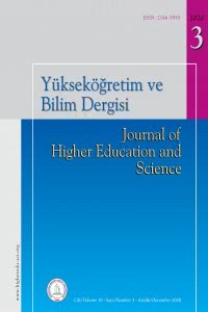Bilgisayar Ortamında Biçimsel Ontoloji Oluşturulması
Biçimsel ontoloji, Biçimsel kavram analizi, Bilgi teknolojileri, Anlamsal yapılar
Construction of Formal Ontology on Computer
___
- Dahiya, Y.V. (1995). Panini as a linguist: Ideas and Patterns. Delhi, India: Eastern Book Linkers.
- Dowty, D. (1991). Thematic Proto-Roles and Argument Selection. Language, 67, 547-619.
- Fillmore, C.J. (1976). Frame semantics and the nature of language. Annals of the New York Academy of Sciences, 280, 20-32. DOI: 10.1111/j.1749-6632.1976.tb25467.x
- Fillmore, C. J., Johnson, C.R., & Petruck, M.R.L. (2003). Background to Framenet. Intertational Journal of Lexicography, 16 (3), 235- 250.
- Ganter, B., & Wille, R. (1996). Formale Begriffsanalyse: Mathematische Grundlagen. Berlin: Springer.
- Gildea, D., & Jurafsky, D. (2002). Automatic Labeling of Semantic Roles. Computational Linguistics, 28(3), 245-288.
- Jackendoff, R. (1993). On the Role of Conceptual Structure in Argument Selection. A Reply to Emonds. Natural Language and Linguistic Theory, 11, 279-312.
- Kılıçaslan, Y., & Güner, E.S. (2011). Filtering Machine Translation Results with Automatically Constructed Concep Lattices. Proceedings of 8th International Conference on Concept Lattices and Their Applications (CLA 2011), Nancy, France.
- Kasper, S. (2008). A comparison of ‘thematic role’ theories. Unpublished master thesis. The Philips University of Malburg.
- ISSN: 2146-5959
- Yayın Aralığı: 3
- Başlangıç: 2011
- Yayıncı: Bülent Ecevit Üniversitesi (Önceden Zonguldak Karaelmas Üniversitesi)
Türkiye’de yüksek lisans ve doktora eğitimi kalitesinin iyileştirilmesi için öneriler
Hemşirelik Öğrencilerinin Uygulama Alanlarında Karşılaştıkları Şiddet
Akademiyi Anımsamak: Anılarda Üniversite Sorunları ve Eleştiriler
Bilgisayar Ortamında Biçimsel Ontoloji Oluşturulması
YELDA FIRAT, Yılmaz KILIÇASLAN, ÖZLEM UÇAR
Türkiye’de dört yıllık üniversite eğitiminin sonunda kim kazanır? hukuk fakültesi örneği
Vakıf Üniversitelerinde Çalışan Okutmanların Örgütsel Bağlılık Düzeylerinin Belirlenmesi
Avrupa Birliği’nde Mesleki Eğitim
